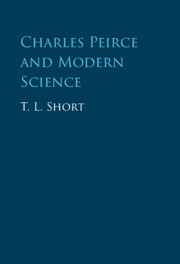Book contents
- Charles Peirce and Modern Science
- Charles Peirce and Modern Science
- Copyright page
- Dedication
- Contents
- Preface
- Acknowledgments
- A Note on Citation of Sources
- Chapter 1 Peirce’s Life in Science: 1859–1891
- Chapter 2 Peirce’s Concept of Science
- Chapter 3 Modern Science Contra Classical Philosophy
- Chapter 4 The Meaning of Pragmatism
- Chapter 5 Misleading Appearances of System
- Chapter 6 Devolution of the Cosmogonic Program
- Chapter 7 Experiments Expanding Empiricism
- Chapter 8 Phaneroscopy and Realism
- Chapter 9 Normative Science
- Chapter 10 Modern Science Contra Modernity
- Bibliography
- Index
Chapter 8 - Phaneroscopy and Realism
Published online by Cambridge University Press: 26 October 2022
- Charles Peirce and Modern Science
- Charles Peirce and Modern Science
- Copyright page
- Dedication
- Contents
- Preface
- Acknowledgments
- A Note on Citation of Sources
- Chapter 1 Peirce’s Life in Science: 1859–1891
- Chapter 2 Peirce’s Concept of Science
- Chapter 3 Modern Science Contra Classical Philosophy
- Chapter 4 The Meaning of Pragmatism
- Chapter 5 Misleading Appearances of System
- Chapter 6 Devolution of the Cosmogonic Program
- Chapter 7 Experiments Expanding Empiricism
- Chapter 8 Phaneroscopy and Realism
- Chapter 9 Normative Science
- Chapter 10 Modern Science Contra Modernity
- Bibliography
- Index
Summary
Peirce’s c.1902 taxonomy of the sciences is briefly described, stressing its anti-foundationalist formulation. That taxonomy identified philosophy as a science of discovery and divided it into several empirical, albeit very general, inquiries. Of these, phaneroscopy (phenomenology) is the most basic. Phaneroscopy depends not only on empiricism’s expansion (Chapter 7) but also on a vocabulary of phaneroscopic description, free of metaphysical assumptions, drawn from the algebra of relations. The resulting three phaneroscopic categories are here developed systematically. Peirce’s 1903 reformulation of pragmatism (Chapter 4) mandated a phaneroscopic account of the meaning of modal and metaphysical ideas – of possibility, actuality, and, especially, law – by which to establish the meaningfulness of modal realism. This implies that some forms of lawfulness are directly perceived. But direct (i.e., non-inferential) perception of lawfulness does not prove law’s reality, which must remain a hypothesis supported, never proven, by common experience and especially by the progress of scientific inquiry.
Keywords
- Type
- Chapter
- Information
- Charles Peirce and Modern Science , pp. 180 - 217Publisher: Cambridge University PressPrint publication year: 2022

